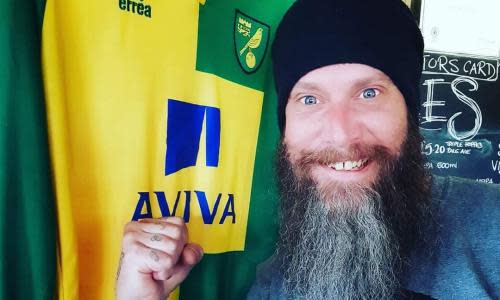'He was a big softie': pub landlord remembered by family and friends

When Dawn Hopkins reopened her pub, the Rose Inn in Norwich, after months of closure because of coronavirus, what should have been a day of celebration was laced with grief.
Four days after the prime minister had announced on 16 March that people should avoid pubs and other social venues, her partner of more than six years, the pub’s landlord, had killed himself.
Carl Newell, 40, who grew up in Sprowston, a small suburban town in Norfolk, was a popular face behind the bar. An inquest in June found that the imminent closure of the venue might have been a factor in his death.
Related: Fifth of vulnerable people considered self-harm in UK lockdown
The case is among 11 recent inquests where coronavirus was cited by relatives or the coroner as a potential factor in a confirmed or suspected suicide. Research shows that a fifth of vulnerable people in Britain thought about self-harming or killing themselves during lockdown.
“The Monday before he died, we went to a hotel to relax for a night and that was the night Boris Johnson said on TV people should avoid going to pubs, without shutting us down,” Hopkins told the Guardian. “We were both anxious about that – that is your livelihood. We had talked about it, but whether he felt we would not get through it – or I would cope better without him there – I cannot say.”
The court heard that Newell had not sought help for mental health problems and had rarely been to the GP in the past few years, although he had experienced anxiety and depression before.
A postmortem found alcohol in his blood and indicators of prior drug use, although it was not known when he had consumed drugs. The report said drug withdrawal effects could include suicidal thoughts.
Giving a conclusion of suicide, the senior coroner, Jacqueline Lake, said: “I have considered the history of anxiety and taken into account the announcement of the closing of pubs due to coronavirus which may have played on his mind. I have also considered the effects of taking drugs and how it increases risk-taking behaviour.”
Hopkins replays the night before her partner died in her mind: they had done a quiz and fewer people than usual had shown up. “We were starting to feel the effects of what was happening, so he was a bit down … It was a down day for both of us but lots of people had also been saying they would still support us,” she said.
Newell took a long time to warm to people but once he did he was very caring, Hopkins said. “I suppose he could be quite introverted at times, but at other times, when he worked here behind the bar, he could be the life and soul of the party.”
More than 100 people wrote messages of support after Hopkins wrote about Newell’s death on the pub’s Facebook page.
Alex Larter, 29, a regular at the Rose Inn, remembers him as a man who loved music and sport. “We spoke a lot about football and music. We both played the drums … We would share drinks and I’d hang out with him when the pub was quiet.”
Larter recalled Newell always wearing flip-flops while working, no matter the weather, to avoid water in the cellars dirtying his shoes. “So our quiz name was ‘Carl’s flip-flops’ most of the year. He could be in a blazer and have a well-groomed beard and be wearing flip-flops,” he said. “He looked like a strong, kind of intimidating guy but he was very charismatic … I very quickly realised he was a big softie and loved a good joke.”
Larter said Newell’s life was built around the pub and he would welcome customers with hugs. “He worked his socks off [for] two years with one week’s holiday, and around February the pub was the busiest it had ever been. He said: ‘I am so proud.’ And then Covid came along and he was telling me ‘this sucks’ as there were plans he had he could no longer do.
“I was there with him at closing time, and had his last pint with him and we talked about how he was doing a lot of work on his own as some staff were off due to concerns around shielding. I said I would come in the next day to help as a volunteer … I think there was a lot of uncertainty and in those two weeks lots of people stopped coming in and that hurt him and there was no guidance from the government.”
On the night he died, Newell and his partner went upstairs after closing the pub and had a takeaway. Hopkins found him dead the next day.
“It is hard standing behind the bar without him for the first time,” she said. “The pub is full of Carl. The pictures on the walls of his favourite band, Kasabian, the styling of the pub, the music we play. We’ll also carry on his tradition of serving the most innovative and creative craft beers we can source. Also, when we can all get together again, we will be hosting the mother of all wakes.”
In the UK and Ireland, Samaritans can be contacted on 116 123 or by emailing jo@samaritans.org or jo@samaritans.ie. In the US, the National Suicide Prevention Lifeline is 1-800-273-8255. In Australia, the crisis support service Lifeline is 13 11 14. Other international helplines can be found at www.befrienders.org. You can contact the mental health charity Mind by calling 0300 123 3393 or visiting mind.org.uk

 Yahoo News
Yahoo News 